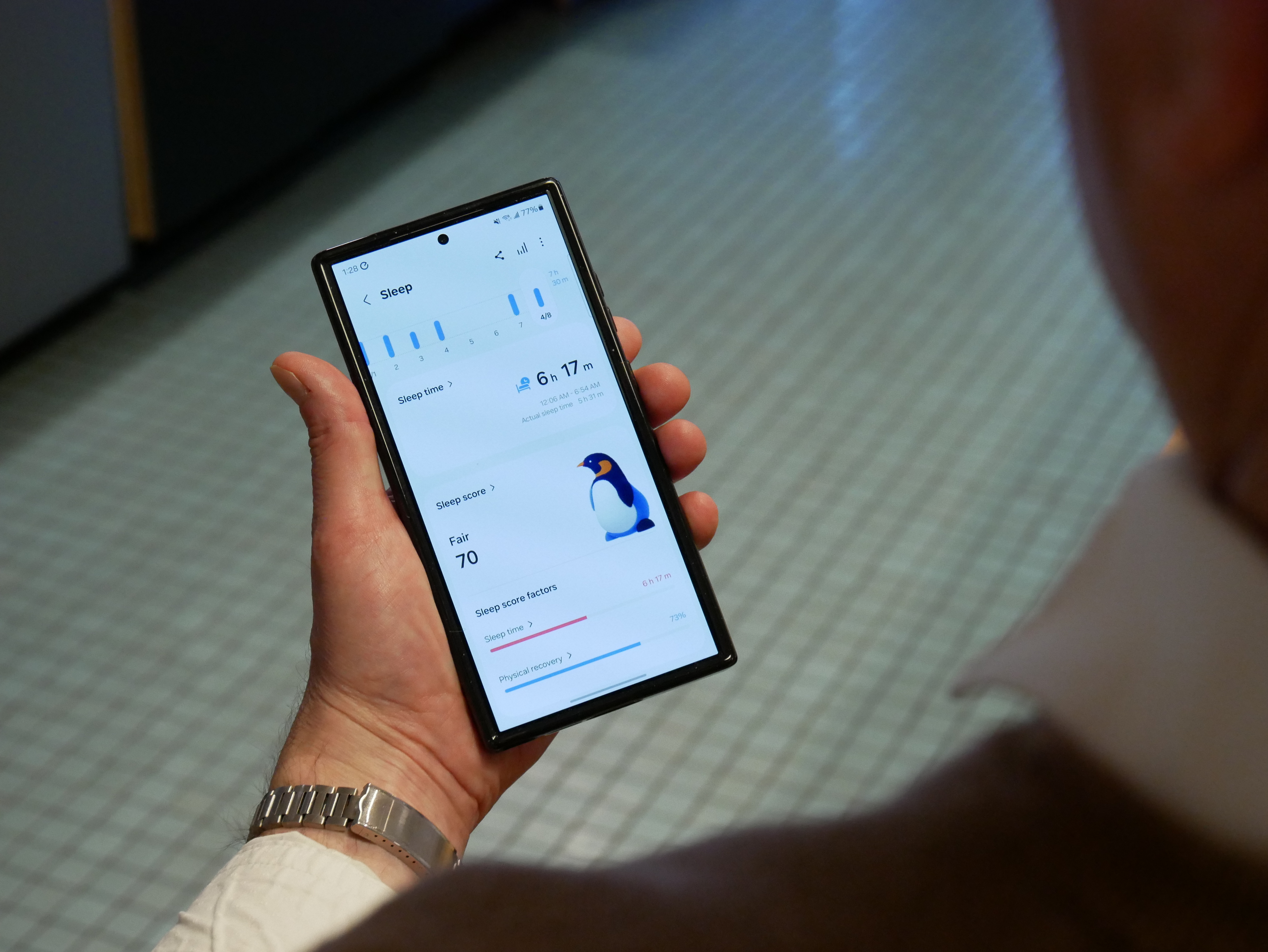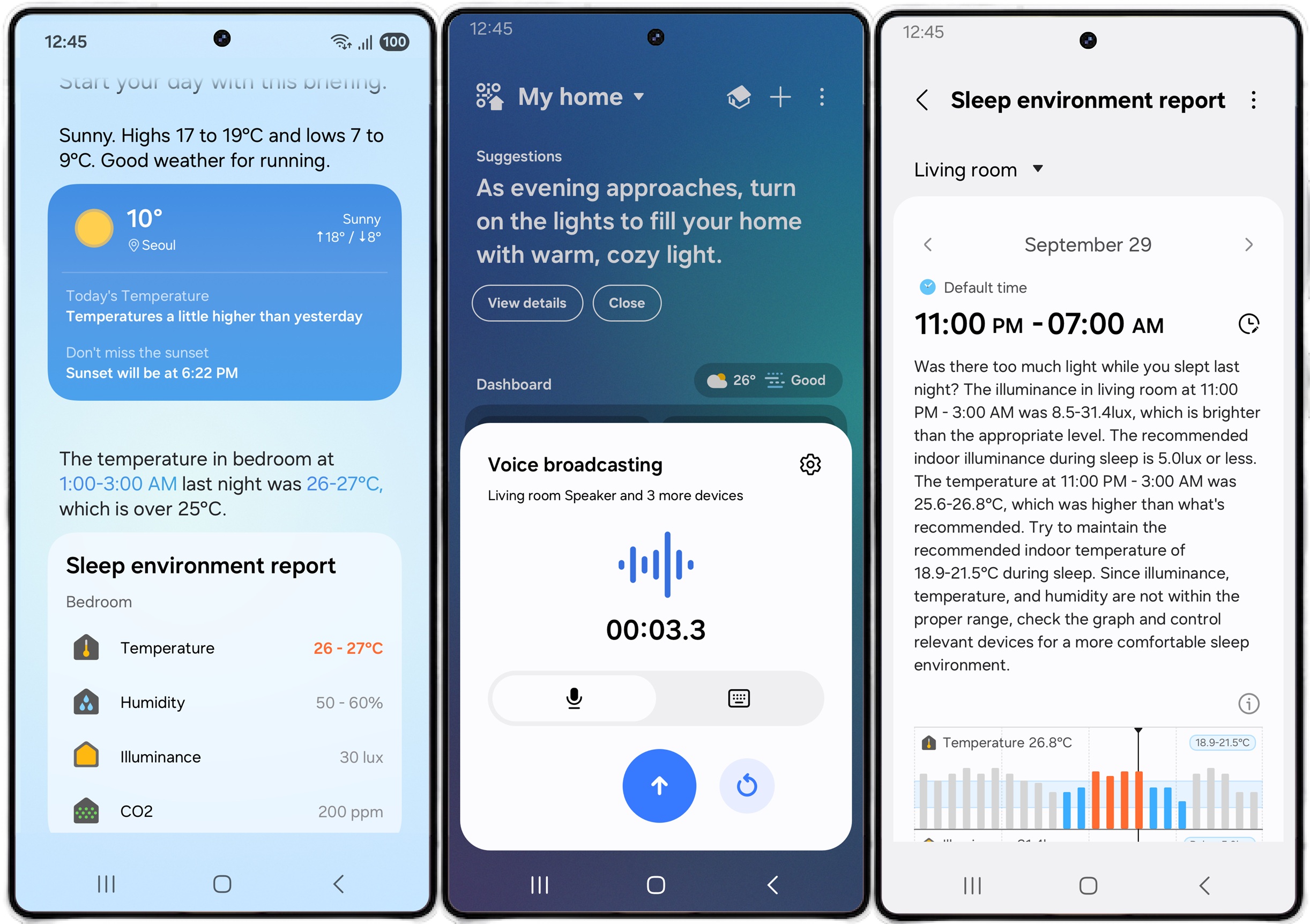Samsung's SmartThings app will put you to sleep: New version supports Matter 1.4, and uses AI to rock you to sleep
Is robust rest really within reach?

Imagine if your gadgets talked to each other over coffee in the kitchen. After pleasantries and “pass the pastries,” what would they discuss? Well, you, of course. “Did Jeremy sleep well last night?” my air purifier might ask my smartwatch, comparing notes about breathing, air circulation, and whatever else. "Can we keep him happier and healthier?" they ask each other. "He’s obviously overstressed… can we help him deal with that?"
That oddball vision of the future was presented during Samsung’s big CES press conference in Las Vegas in January, and frankly, it felt a little goofy. The dishwasher doesn’t have googly eyes and a personality, after all. Like the animatronic robots at Disney World, it described a future both wonderfully impossible and as far off as a dream. But here’s the thing: It’s not.
On Wednesday, April 9, Samsung unveiled a major update to the SmartThings app (release 3.28.25 – whatever happened to cool code names?). It includes expanded support for Matter 1.4 and energy management devices, a new intercom functionality and expanded Routine functions. And, for the first time, it all integrates directly with the Samsung Health app to help your gadgets make personalized decisions to improve your health and wellbeing.
The amount of data we generate in society today vastly exceeds the amount we are able to use
Jonathan Gabrio
“The amount of data we are generating in society today vastly exceeds the amount we are able to use,” Jonathan Gabrio, Head of the Connected Experience Center at Samsung, told me a few weeks ago. “How do we use AI and different kinds of connective technologies to make that useful to the average human being? And sleep is one of those huge opportunities.”
Gabrio leads the Connected Experience Center, where he examines how AI and IoT technologies come together. Your robovac and smart ring might not have goofy personalities, but they collect enormous amounts of data.
One of the biggest challenges the technology world faces is turning all that information into something meaningful and actionable, a fact I’ve seen first-hand: After half a decade, I recently retired my Oura ring. Daily checking into my sleep cycles revealed exactly nothing I felt I could use. Samsung thinks the power of SmartThings can make it easier to learn about our sleep patterns – and by learning, improve them.
“How do we not just make better things but make things better,” Gabrio said. “That’s the interesting part of the conversation we’re at as a society now.”
Sign up for breaking news, reviews, opinion, top tech deals, and more.
A new bedtime routine

SmartThings today lets you create Routines, a way to tie together your devices: You can set the mood for dinner by dimming the lighting and putting on mood music, for example. A sleep Routine might adjust lighting, temperature, humidity, and other environmental factors to optimize for that deep slumber you can’t seem to get any more.
With the new update, these Routines can be triggered automatically when your body actually dials down for the evening or wakes up in the morning, rather than on a fixed schedule.
A good night’s sleep is dependent on more than just closing your eyes and counting sheep: There are biological factors like when you last ate and how much wine you consumed before bed, for example, as well as environmental factors. Thanks to smart devices, a huge data stream about your environment is possible that simply didn’t exist before. Think lumens, CO2 levels, humidity and temperature, and so on.
Samsung’s SmartThings can optimize based on data from all of those things, not just the biometric data from your Galaxy Watch. It can detect if you sleep best when the temperature is between 61-65 degrees Fahrenheit / 16-18 degrees Celsius and adjust your heat pump to actively maintain that range. The same Routine can detect when you wake and automatically warm the room up, brighten the lights, and turn on your morning news.
Here’s the best part: Track that info for a few days – you can see it in a new Sleep Environment Report – and a brand new Routine Creation Assistant (at last!) will use generative AI to build a routine for you. You won’t have to mine through the data to figure out what keeps you snoring, in other words. And if you have a newer Samsung TV, which can act as a SmartThings hub, it’ll suggest you turn off the basketball and get ready for bed.
Sleep Science 2.0
Sound a little crazy? It’s more popular than you might think. Sleep tracking has increased 17% since 2020 among younger users of Samsung’s wearable lineup of Watches and Rings, Gabrio tells me. 30% of these folks use the feature, according to Samsung, meaning sleep tracking isn’t just a problem for harried parents and overworked employees. It’s a big concern for everyone. But strangely, our modern obsession with sleep hasn’t really changed the fundamentals.
“Interestingly, our understanding of healthy sleep has not really changed even with all this new data,” Vanessa Hill, an Australian sleep researcher, tells TechRadar. “The recommendation remains 7–9 hours for adults, varying by age … What has evolved is our understanding of sleep health as multidimensional (going beyond just duration).
Our understanding of healthy sleep has not really changed even with all this new data
Vanessa Hill, sleep scientist
“Recent research suggests that sleep regularity, maintaining a consistent bedtime and wake time, may be more predictive of long-term health than sleep duration alone.”
Hill doesn’t recommend poring over your stats on a daily basis, as I had done for years with my Oura ring. For some, continuous data can heighten stress or lead to orthosomnia (anxiety-driven sleep disturbances from obsessing over metrics), she notes. That was me in a nutshell, but thanks to AI, and its broader ability to analyze multiple data points longitudinally, we can gradually improve behaviors.
“AI can turn health data (which is often complex) into personalized insights that help make it easier to understand,” she says. Applying those insights and keeping to a new routine can be tough, as anyone who’s tried to diet will tell you. Samsung’s app cleverly sorts people into categories with cute animal avatars – I’m a penguin, apparently. Automated Routines should make it easier to stick to our convictions. And all of it might help you drift off easier and stay asleep longer. Dreamland awaits!
After 25 years covering the technology industry, Jeremy Kaplan is a familiar face in the media world. As Content Director for TechRadar, he oversees product development and quality. He was formerly Editor in Chief of Digital Trends, where he transformed a niche publisher into one of the fastest growing properties in digital media. Before that, he spent half a decade at one of the largest news agencies in the world, and cut his teeth in magazine business, long before the birth of the iPhone. In 2019, he was named to the FOLIO: 100, which honors publishing professionals making an industry-wide impact.
You must confirm your public display name before commenting
Please logout and then login again, you will then be prompted to enter your display name.